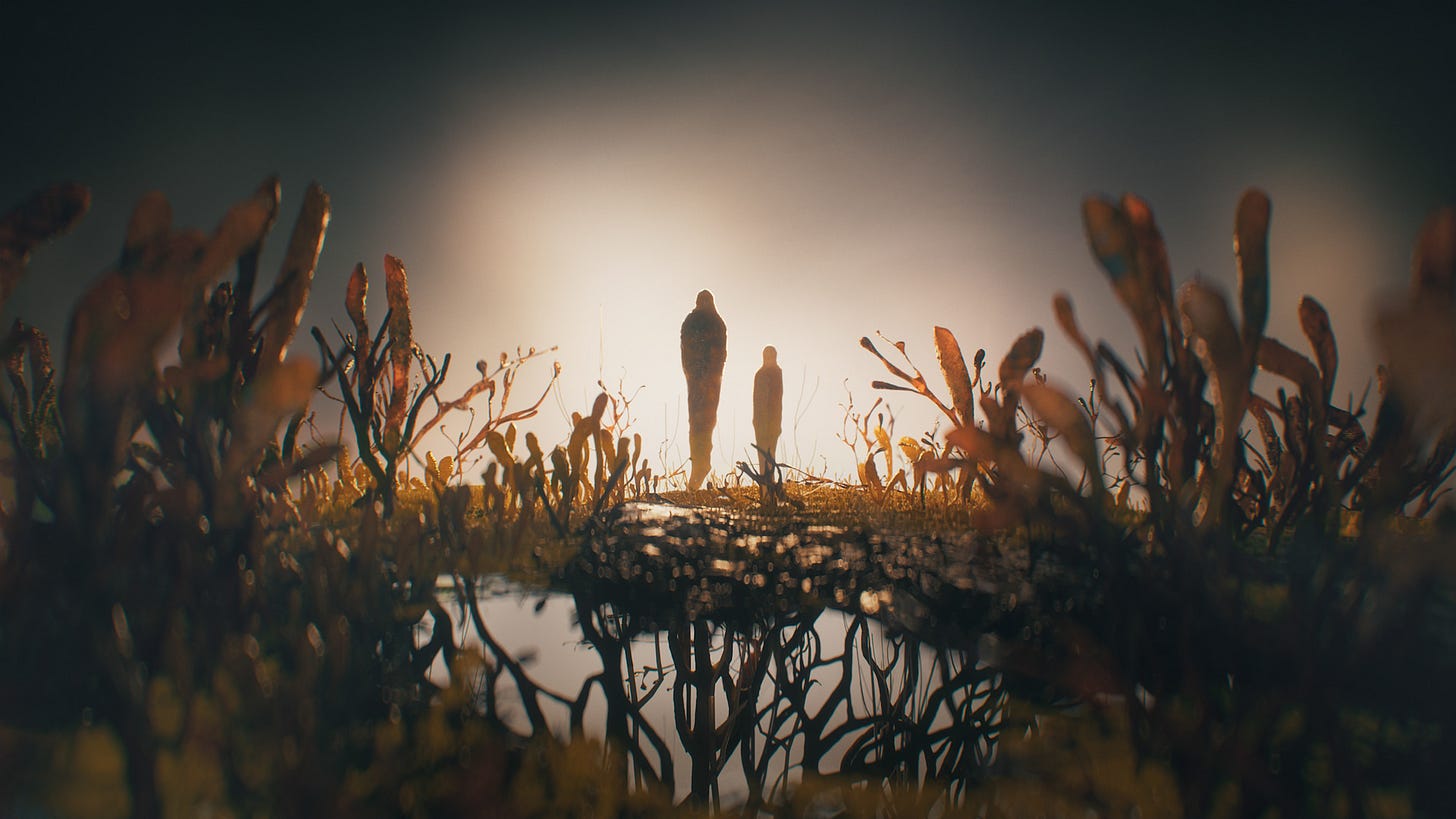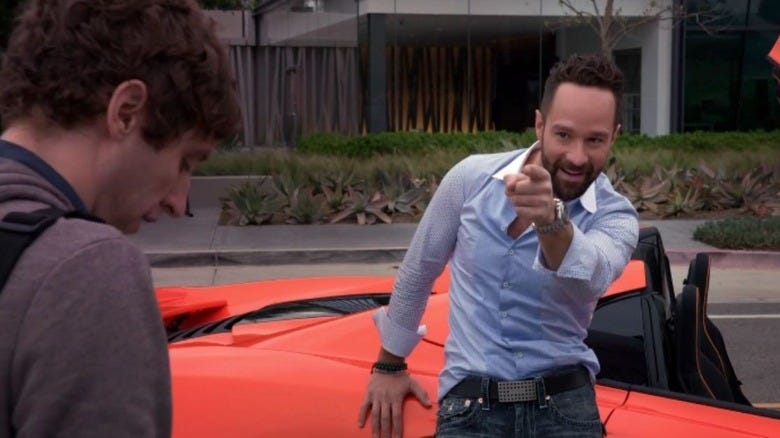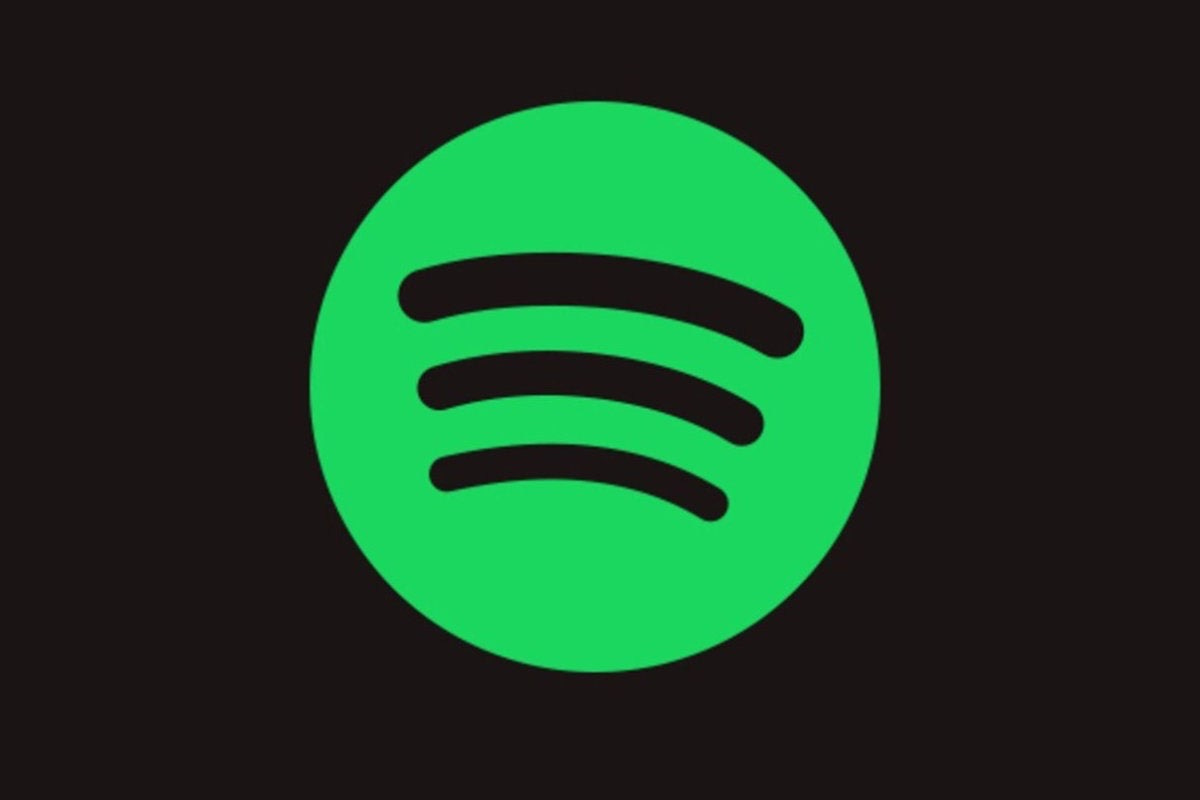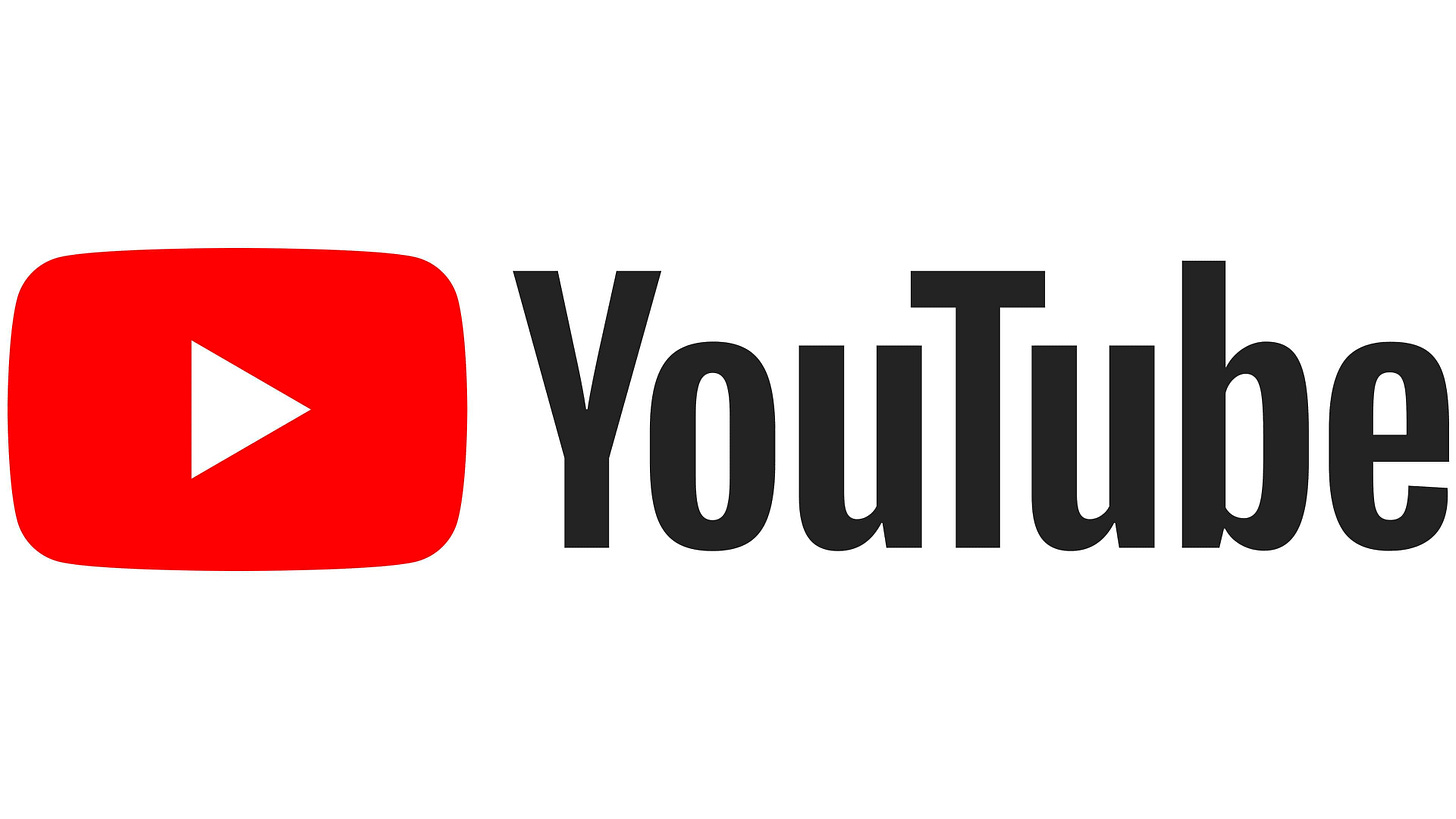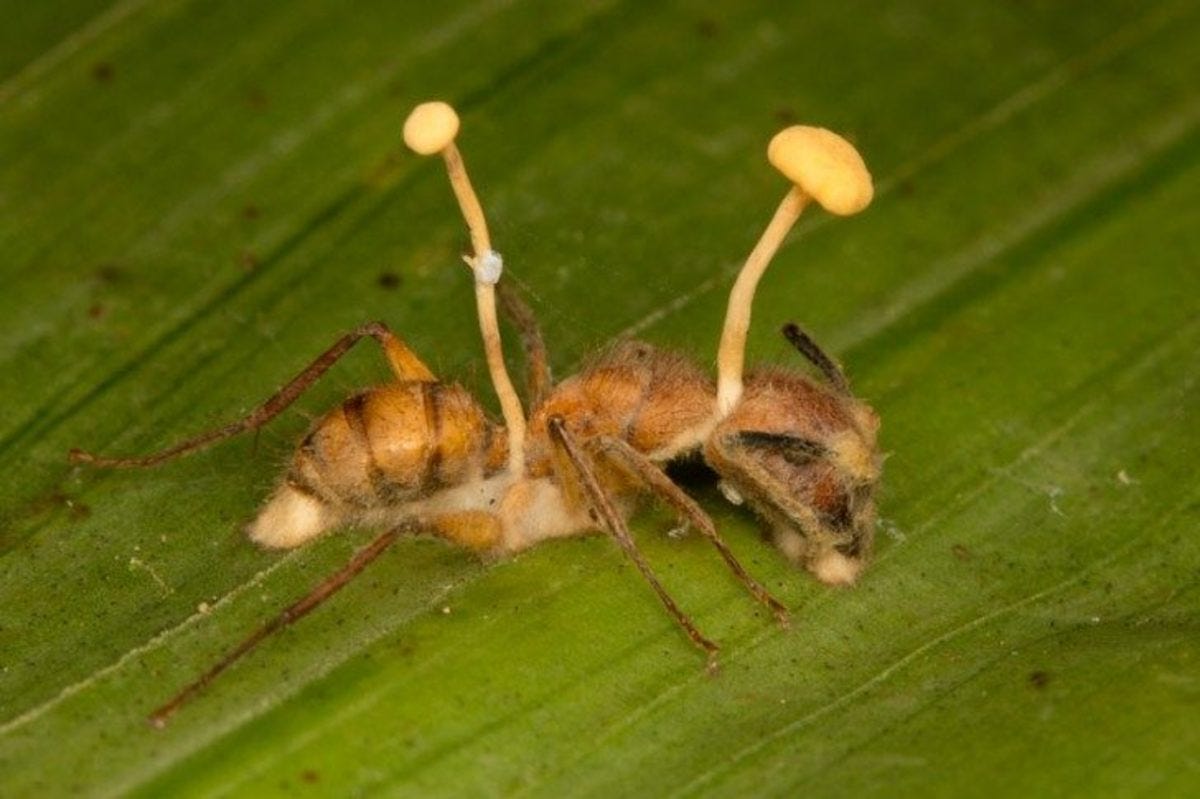The Parasite Economy
It’s hard to do business with fungus in your brain, but seemingly impossible without it.
I want to talk about parasitic fungus, and the content creation economy. Like you do.
When I started making podcasts and we had a bit of success, topping various charts and getting excitable press coverage, reaching surprisingly big audiences in those halcyon level-playing-field days, I invited in a bunch of money people to look at what we were doing and see if they wanted to put some cash in. It’s the only time I’ve ever tried to drum up investment. It seemed to be what you ought to do in a new industry, and we thought it might mean we could start drawing a tiny salary while we built the otherwise unpaid business that was taking up most of our time.
These investors were interested because there was a bit of a buzz around us, and podcasting was this sexy new medium that few people seemed to understand. This was before the lockdown podcast boom and the corporate takeover, so, back then, who knew? Maybe anyone who could make good content would be worth investing in. Maybe there was going to be serious money in making popular audio shows outside traditional media.
A week later, having looked at the numbers, these money guys came back and asked if we had considered stopping making shows altogether, and did we knew anyone in tech who could code a hosting and ad sales platform?
I said “no” we just had loads of experience making popular audio shows and podcasts and comedy and were pretty good at that. Did they want to invest in our “content"“?
No.
Would we maybe consider swapping the business to a tech and ad sales business? And use our contacts to get other people to make the shows? We seemed to know some good creators, comedians, actors, presenters, producers, writers. We could offer them a platform. They could make the programmes.
We said we were only podcasting at all because we liked making shows, and wanted to get round the gatekeepers at radio and TV who wouldn’t let us make the sort of programmes we wanted to make. All the tech and the platform stuff was - for us - a means to an end. We were programme makers. We didn’t want to become distributors or salespeople.
Ah.
They said they weren’t interested. They’d looked very hard at the numbers, and clearly the only profitable area for the “content creation” industry was as a middleman or distributor. Not as a creator.
It was the first time that I understood the parasite economy.
Creation now is very hard work. Because it is so rarely funded or paid in the way it used to be, but you are still expected to turn the stuff out.
It’s not *quite* a job any more, even though it takes up the same amount of time, if not more, than it would have done thirty years ago. And the audiences expect what you make to be of a pretty high standard, because the competition is very slick indeed.
And you want to do it, of course, because you like making stuff, and people say they like what you make. As a creator, therefore, you are very busy, and often exhausted and underpaid. Someone offering to take any of the admin or tech burden off your shoulders is a godsend.
That’s how they get in. The parasites.
They can take many forms. Usually it’s someone offering to do something for you, or streamline it. Technology supposedly puts all this stuff in our hands directly as creators, but as a one-person business, we might not have time to learn to code a website or understand RSS feeds or grasp e-commerce integration and legislation.
“Starting a podcast business with BumBumNoise is easy. We’ll handle the hosting and collect your subscriptions. We’ve got templates and even merchandise options…”
Thank god. Cos I’m busy making something that only a few years ago, as a radio programme, would have had a crew of half a dozen, but I’m doing it on my own, on a budget of nought.
Blogging, designing a website, selling your art, distributing your music, hosting your videos, running a podcast feed, crowdfunding a book… (yeah, that one)… these are all things you could theoretically do on your own. You could have your own website with this stuff embedded. It’s a level playing field. A URL is a URL, right?
But companies have sprung up to offer to take all the boring, fiddly-looking tech and business admin off your hands. So you jump at the chance, offer them a slice of your earnings to deal with all that bullshit, and get on with making your art.
And they’re doing very nicely. Because they only need to create once: a new platform or a service. And the content which fills that platform will flood in from creatives. The platform people don’t have to make anything. They’re not hitting a weekly deadline to offer new shows and art and music and jokes and so on. They’re acting as a middleman. Taking a little slice. And providing an often very slick service that busy creative people really appreciate.
Theyre parasites, sure. But they’re benign.
Well, they’re benign while they’re benign, anyway. We invite them in. Sometimes they turn out to be toxic or unsavoury. To have some fucking horrible friends. Their priorities maybe very different to yours. But you don’t really have a choice; unless you want to take on yet more tasks, doing the dull grunt work behind your art. And often, as in the case of Spotify or YouTube, they’ve done their middleman job so well that they’ve the only place you can really do business. On their terms of course.
Sometimes the parasites are quite big. Sometimes they’re not so benign. They’re pretty aggressive. They can shut you out on a whim, cut off your income. Or pivot to soft-Nazism or simply whack up their fees - all without ever making a single creative thing themselves. Sometimes their behaviour elsewhere can stink up your workshop and drive all your audience away. Sometimes they sell your work to AI companies to plunder your IP. Sometimes they just plain steal your money.
Sometimes they’re really bad for you…
Sometimes these particular modern parasites are that invasive fungus from The Last Of Us. You know. Cordyceps. The one that gets into the brains of rainforest ants and drives them mental.
And later as you find yourself climbing to the top of a very high twig with a mushroom sprouting from your addled creator’s brain, you realise you were hijacked to serve the needs of a parasitic distributor fungus that worked out it could get all sort of exciting and profitable places on your busy little creator ant legs.
But the idea of trying to get anywhere in the current creative industries *without* a parasitic fungus sprouting from your brain is almost unthinkable. They made it seem inevitable. By making the technical workload so daunting, that any one-person business needs help.
And it’s impossible to imagine not using them. From Spotify to PayPal to Stripe to Substack to Squarespace to YouTube to BandCamp to Amazon to Gmail… all those passwords, all those extra layers of service round your work… All that extra vulnerability. Remember how hard it was to suddenly move everything off Twitter?
Imagine starting your own blogging or music distribution or video or subscription collecting site. Imagine pivoting to collecting your own podcast dynamic ad sales and host read revenue, like those investors proposed. It’s not the wild west anymore. We’re not start-ups. It’s incredibly daunting, to the extent seems almost unthinkable.
Why would I even want to disentangle myself from PayPal and Spotify and Google and all that? How would I begin to talk direct to my readers and listeners and viewers, without looking like a rank amateur, running my business from a crappy little backwater website I designed myself? Surely we all use Apple Podcasts and YouTube and Substack, right? Or we look shoddy.
I want to be in the same marketplace as everybody else.
We need these guys, right?
We forgot: they need us.
They’re parasites on our work. But we can’t imagine doing business without them.
That’s probably cos of all the fungus in our brains.





